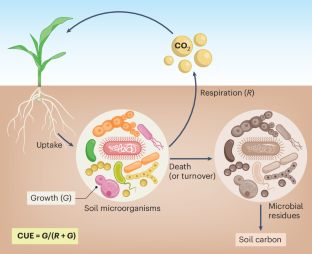重新思考土壤模型中的微生物碳利用效率
IF 27.1
1区 地球科学
Q1 ENVIRONMENTAL SCIENCES
引用次数: 0
摘要
土壤模型包括一个称为 "碳利用效率 "的关键参数,它通过确定碳相对于大气流入土壤池的情况,影响全球碳储存的估算。这些模型的微生物显式版本需要进行更新,将碳利用效率作为微生物新陈代谢产生的输出变量。本文章由计算机程序翻译,如有差异,请以英文原文为准。


Rethinking microbial carbon use efficiency in soil models
Soil models include a key parameter known as carbon use efficiency, which impacts estimates of global carbon storage by determining the flow of carbon into soil pools versus the atmosphere. Microbial-explicit versions of these models are due for an update that recasts carbon use efficiency as an output variable emerging from microbial metabolism.
求助全文
通过发布文献求助,成功后即可免费获取论文全文。
去求助
来源期刊

Nature Climate Change
ENVIRONMENTAL SCIENCES-METEOROLOGY & ATMOSPHERIC SCIENCES
CiteScore
40.30
自引率
1.60%
发文量
267
审稿时长
4-8 weeks
期刊介绍:
Nature Climate Change is dedicated to addressing the scientific challenge of understanding Earth's changing climate and its societal implications. As a monthly journal, it publishes significant and cutting-edge research on the nature, causes, and impacts of global climate change, as well as its implications for the economy, policy, and the world at large.
The journal publishes original research spanning the natural and social sciences, synthesizing interdisciplinary research to provide a comprehensive understanding of climate change. It upholds the high standards set by all Nature-branded journals, ensuring top-tier original research through a fair and rigorous review process, broad readership access, high standards of copy editing and production, rapid publication, and independence from academic societies and other vested interests.
Nature Climate Change serves as a platform for discussion among experts, publishing opinion, analysis, and review articles. It also features Research Highlights to highlight important developments in the field and original reporting from renowned science journalists in the form of feature articles.
Topics covered in the journal include adaptation, atmospheric science, ecology, economics, energy, impacts and vulnerability, mitigation, oceanography, policy, sociology, and sustainability, among others.
 求助内容:
求助内容: 应助结果提醒方式:
应助结果提醒方式:


